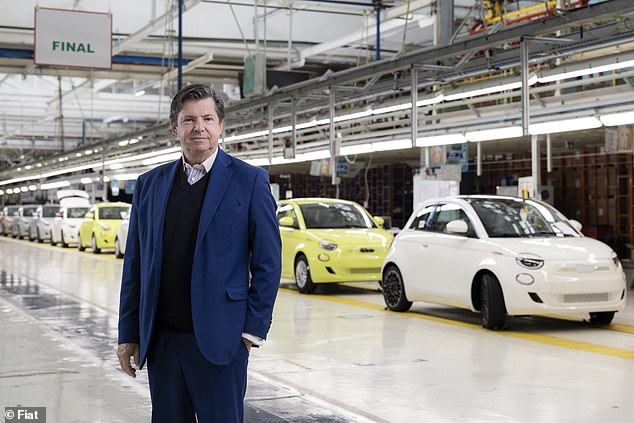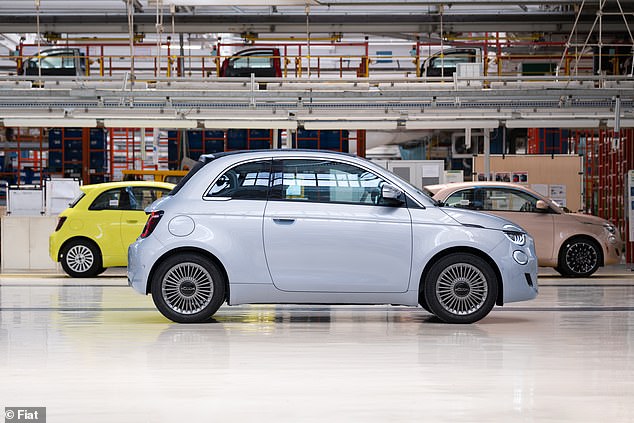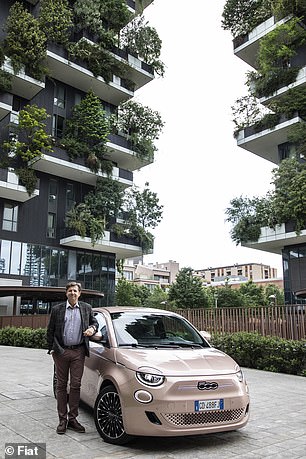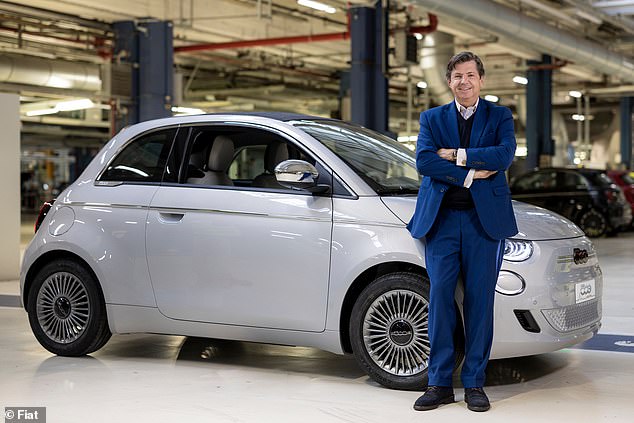Fiat will reintroduce a petrol-powered 500 city car within the next two years due to a lack of demand for electric vehicles, particularly among older drivers, its CEO said.
Olivier Francois confirmed in an interview that the new petrol-powered Ibrida 500 will arrive in early 2026 due to a “slower than expected adoption of electric vehicles in Europe”. Coach.
However, he confirmed that it will be the final version of the small retro car to have an internal combustion engine, as the EU is set to ban the sale of new petrol and diesel vehicles from 2035.
Fiat Chief Executive Olivier Francois (pictured) said the new 500 Ibrida petrol mild hybrid will arrive in early 2026 due to slower than expected adoption of electric vehicles in Europe, especially among older drivers.
There have been many examples in recent history of combustion engine platforms being repurposed to accommodate electric powertrains.
Volkswagen’s first-generation electric vehicles, such as the e-Golf and e-Up!, were essentially combustion cars with built-in batteries and electric motors.
But the Fiat 500 Ibrida will change the script and equip a gasoline engine in an electric vehicle body.
The latest version of Fiat’s popular 500 arrived in Britain in early 2021 and was launched across Europe exclusively as an EV, while the Italian brand simultaneously continued to sell petrol-powered examples of the previous-generation car for those who didn’t want an EV.
However, the introduction of the EU’s General Safety Regulation II on 7 July 2024 (the same rules that require all new models to be fitted with Intelligent Speed Assist (ISA) speed limiters) has effectively killed off the aging 500, which is based on a 20-year-old platform that doesn’t meet the new requirements.
As such, the 500e’s architecture will now be modified to adopt a petrol engine for those European buyers who “have turned their backs on the sustainable solution,” the Fiat boss said at the brand’s 125th anniversary celebrations in Turin this week.
This slow adoption of electric vehicles is reflected in the drop in sales of 500 models.
By 2023, almost two-thirds (63 percent) of 500 registrations in Europe were petrol variants, despite the 500e offering the latest technology and a much more advanced package.
Francois explained that the car company had anticipated that “the world would go electric faster and the cost of electrification would come down faster” but says the impact of Covid and raw material shortages significantly impacted the EV revolution.
He added that the company “could not imagine” that all but “the youngest” drivers would “turn their backs” on electric cars as a result.
“This is the reality. We have to face it,” he said.

Francois told Autocar that Fiat had anticipated that “the world would go electric faster and the cost of electrification would come down faster.”

The same 1.0-litre mild-hybrid petrol engine from the previous-generation 500 will now be fitted to the new 500e, which was intended to be electric-only when it was launched in 2020 and went on sale in Britain a year later.
The 2026 Fiat 500 Ibrida (which translates from Italian as hybrid) will be powered by the same 1.0-liter mild-hybrid three-cylinder gasoline engine as the outgoing model.
Francois is convinced that these will be the last 500 Fiats to be launched with a petrol engine before the EU bans the sale of new cars with internal combustion engines in 2035.
“It will die and people will go electric,” he proclaimed.

Francois photographed next to the all-electric Fiat 500
In June, Francois confirmed that the petrol-powered 500 Ibrida would arrive in 2026, stating: “To increase the number of 500s on the road in Italy and respond to Italian customers, we have decided to produce the new 500 Ibrida.”
Based on the 500e platform, production of the 500e petrol hybrid will be moved from Poland to Turin, to the Mirafiori plant where the electric city car is built.
“It is clear that Mirafiori plays a strategic role for the brand and we will also continue to invest in Italy, in the 500 and in Mirafiori,” Francois said last month.
Fiat is owned by the Stellantis Group, which is also the parent company of Citroën, Peugeot, Vauxhall (or Open in Europe), Alfa Romeo, Jeep and Maserati.
Other brands under the same banner have also changed their plans to phase out combustion cars in recent months.
For example, Jeep’s Avenger SUV was, like the 500e, intended to be sold exclusively as an electric vehicle in the UK, but has since been marketed with a petrol engine due to a lack of demand for battery-powered cars.
Citroën has made the same decision with the C4 X.
The news comes after Jaguar confirmed at a recent investor meeting that it would cease production of almost its entire existing model lineup, including its only electric vehicle, as it accelerates its shift to becoming an “all-electric luxury brand” to rival Tesla from next year.
Production of the XE and XF sedans and the F-Type sports car in Britain, as well as production of the E-Pace compact SUV and the I-Pace electric vehicle in Austria, will come to an end.
Only the F-Pace SUV has survived the phase-out.

Some links in this article may be affiliate links. If you click on them we may earn a small commission. This helps us fund This Is Money and keep it free to use. We do not write articles to promote products. We do not allow any commercial relationships to affect our editorial independence.


